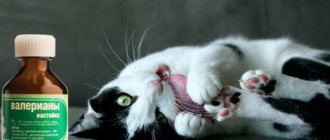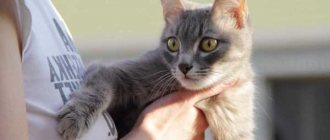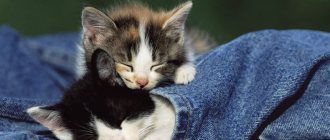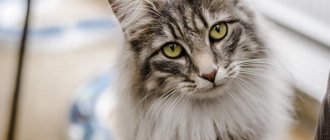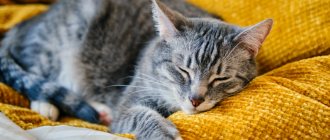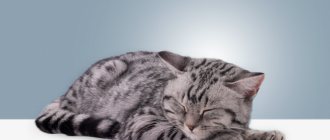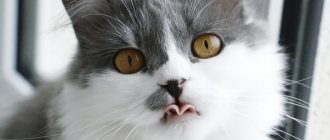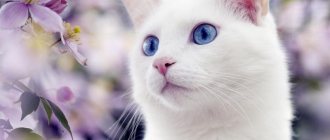All people are very familiar with the plant valerian; they take it in drops or tablets in order to calm down. However, cats behave completely differently after valerian. In our article we will try to figure out why cats love valerian and how it affects their mustachioed pets.
Why Valerian Attracts Cats
Seeing how the behavior of cats changes after consuming this plant, zoologists decided to figure out why cats love valerian, and made several conclusions:
- They like it because of the similarity of the smell of the plant and the smell of hormones present in cat urine. In animals, the level of hormones in the blood increases, up to euphoria.
- The root of the plant contains the substance actinidin, which is addictive in the cat family, that is, it acts like a drug and the cat cannot tear himself away from valerian.
- There is also an opinion that long ago, when cats lived in the wild, they used this plant as a painkiller.
Can cats take valerian tablets?
The tablets may seem less dangerous than the tincture due to their minimal alcohol content. But that's not true. In addition to valerian, the tablets contain synthetic substances that are much more harmful than the herbal extract. They can lead to allergies and severe poisoning.
If your pet still tries valerian and immediately falls asleep after the quick euphoric effect, you must immediately take her to a veterinary clinic and consult with a specialist.
How does the plant work?
What does valerian mean for cats, can it be given to an animal? There is no clear answer to this question. Let's look at the pros and cons of this influence.
Minuses:
- Valerian for cats is a narcotic drug. At first they experience excitement, then relaxation occurs, right up to a narcotic sleep.
- Valerian is a hallucinogenic drug for cats.
- Valerian and cats are incompatible things, but the animal thinks differently. If you give it to your pet, he will get used to this drug and do everything to try it again and again. If an animal is given a large amount of water to drink, a coma may occur, which manifests itself as follows: the cat falls to the floor, it develops convulsions, foam, and its eyes roll back.
- Sometimes death may occur due to heart attack, stroke or respiratory arrest.
- Sometimes, consuming this plant may cause your pet to experience panic and uncontrollable behavior that will last for several days.
Valerian has no effect on kittens less than six months old.
Pros:
- You can give the plant to relieve pain caused by spasms; it relieves gastrointestinal spasms well.
- For diseases of the thyroid gland, it can be given as an infusion.
- Used for nervous and cardiovascular diseases.
- Sometimes, for eye diseases, rinsing is done with an infusion of valerian root.
How much valerian can a cat have?
Symptoms of overdose appear differently in each animal, and the dose may vary. So this question is completely individual. Valerian is a drug like the others, so the pleasure may be very short, but the harm will be irreparable. A toy with valerian for a cat is also at risk. Hill's veterinary specialists recommend using analogs with catnip, which has a beneficial effect on animals.
In general, any type of cat intoxication is the result of serious processes occurring in their body. To please your pet, it is better to buy a ball of dry catnip for the fluffy beauty.
How to make an infusion to treat certain diseases
Valerian and cats can be compatible, if, of course, the herb was prescribed to your pet by a veterinarian. For medicinal properties, it is used when the root of the plant is previously crushed and infused in boiling water (5 grams of the root is infused in a glass of boiling water for 2 hours in a water bath).
You can give the infusion strictly in the dosages prescribed by the veterinarian, otherwise an overdose may occur.
When do doctors prescribe this medication for pets?
Despite the fact that valerian is harmful to cats, sometimes veterinarians prescribe it to animals in a small dose as a medicine. If the cat is lazy, passive, and suffers from lack of appetite, he is prescribed this medicine to increase his vital activity.
Treatment with valerian is useful for the following diseases:
- Chinchilla
- Dog breeds
- Urban dog breeds
- Origin of the cat
- Hypoallergenic dogs
- Fighting dog breeds
- Problems with the nervous system.
- Heart diseases.
- Diseases associated with the thyroid gland.
- Diseases of the gastrointestinal tract.
The dosage in such cases is selected only by a specialist, treatment occurs under his supervision.
Behavior of cats after taking valerian
Everyone knows that a cat and valerian are incompatible concepts; it acts on pets like alcohol or a drug. Zoologists say that valerian and a cat are the same as cocaine and a person. Scientists say that the animal will experience a state of euphoria, hallucinations, and a lack of coordination. Sometimes pets are unable to stay on their feet, sway in different directions, do not fit into the doorway, roll on the floor, they either attack an invisible target or flee from a non-existent enemy. During all these actions, they scream loudly and do not get their bowl - naturally, valerian is harmful to their health.
If you periodically allow the use of valerian, which is harmful to the cat, then you can subsequently end up with a degraded animal, with completely forgotten skills, with ignorance of its bowl, tray and even owner. His hair will begin to fall out, baldness will begin, and signs of depression will appear.
If the pet, after strong excitement and euphoria, sleeps soundly, then it is necessary to urgently take it to the clinic.
How to influence a cat with valerian
In addition to treatment, some owners use the plant to accustom them to scratching posts and litter boxes, as well as to calm their pets during estrus. Due to the possible harm, the safety of these actions remains a big question.
Training to a scratching post or tray
It is better to accustom him to the toilet and scratching post from childhood. The plant has no effect on kittens, so it is better to choose safer and more effective drugs. Drops are suitable for adult animals, but it is better not to abuse such a training tool.
Is Valerian good for calming cats?
Reducing sexual desire by stimulating it is a disastrous idea. After valerian, cats become even more excited. Their behavior is very difficult to predict, and an incorrectly selected dosage can cause addiction in the animal.
If the smell of a volatile substance can deceive the pet, creating the illusion of the presence of the opposite sex, then such an effect will be short-lived. It won't solve the problem, so it's best to see a veterinarian.
In all cases, sterilization remains the most effective solution. The operation not only eliminates sexual desire and the ability to conceive, but also prevents the development of cancer.
Does valerian affect all cats the same?
It’s interesting, but there are some mustachioed pets that can’t stand the smell of valerian. Approximately 30% of cats are not susceptible to this medicinal plant. There are breeds of cats that do not react to it in any way, for example, the percentage of intolerance to valerian in Siamese cats increases significantly - approximately 70% are not friendly with this insidious plant. Scientists, trying to answer the question of why cats love valerian, came to the conclusion that the hereditary factor plays an important role, that is, when the parents were dependent on it, the offspring will also be not indifferent to its influence.
Cats are less prone to valerian-induced addiction than female cats, in which the susceptibility increases by 3 times.
We hope that after reading our article, every owner will conclude that a cat and valerian are opposite concepts. Of course, it is not a fact that your pet will be affected by this drug, but health, both physical and psychological, is still more important than experimenting with the effect of valerian on your cat.
Alternative
There is another plant in nature that is very attractive to cats: catnip, or simply “catnip” in common parlance. Smelling the smell emanating from catnip, the furry pet instantly rushes to the bush, rubs against it and rolls on the ground.
In small quantities, such exposure is completely safe, but if an animal eats catnip, severe poisoning is possible, so it is necessary to carefully monitor the pet in the open air.
General information about valerian officinalis
Valerian has been known for a long time, since ancient times.
It is believed that the most medicinal parts of this plant are the roots, which have always been used in ancient Greece, Egypt, Rome, the East, and India. But besides the scientific name - valerian officinalis, this plant also has several names that it received among the people - cat grass , cat root, maun - grass. This is due to the fact that the smell of this plant has a special effect on cats.
Valerian is a plant that belongs to the family of perennial herbs . This grass grows near water bodies, as well as in wetlands and lowlands. The plant consists of the following parts:
- A thick and tall stem that can reach a height of up to two meters.
- Pinkish flowers collected in an umbrella.
- A small, short and loose root that has many branches.
As soon as cats hear the smell of this plant, they will immediately gather near this place. It has been proven that cats can hear this smell at a very long distance. The reaction of cats to this medicinal plant is unusual: they roll around, trying to damage the plants, then lick the juice .
This leads to the fact that they begin to roll and roll on the ground, they can still jump, but, most importantly, they meow very much . The stimulating effect of valerian only affects cats; for humans, this medicinal plant is used as a sedative.
Dosage
In certain cases, a cat can use valerian. The main thing in such a situation is not to overdo it with the dose of medicine. The maximum dose for a cat is a couple of drops, which can be placed on the cat’s nose or diluted in a small amount of water and given to drink.
Valerian tablets, in addition to the extract, contain a large amount of unnecessary chemicals, and therefore their effect will be zero . In addition, chemicals can seriously harm the animal. The conclusion from this is that cats should not be given valerian tablets.
© shutterstock
Is it possible to calm a cat with valerian?
Valerian does not calm cats, but excites them. The long sleep that follows is only the result of a natural change in the processes of excitation and inhibition in the central nervous system. Deep sleep is the cat’s body’s reaction to stress and depletion of internal resources caused by the effects of the drug.
If you give a cat valerian to calm it down, in the first half hour its reaction will be the opposite of the desired one - the animal will first “go crazy”, and only then calm down and fall asleep.
If you need to calm your cat down or euthanize him before a long journey, you can buy special products at a veterinary pharmacy. There are many herbal preparations for animals that are practically safe for them. Some remedies also add very small doses of valerian, which in combination with other medicinal substances can contribute to a sedative effect.
It is not recommended to give an animal any drug before vaccination to calm it down without a veterinarian's prescription. Medicinal components may interact, which can be dangerous to the cat’s health.
On a note
To calm cats, motherwort-based preparations are sometimes used. However, you can only give cats special products purchased at a veterinary pharmacy or pet supply store. Since motherwort does not provide a quick effect, veterinarians advise giving it to cats 4-5 days before the expected stressful situation.
Overdose
Since valerian has an intoxicating effect on cats, some animals get used to the aromatic drug from the first “dose”. There are cases where cats managed to eat a package of tablets and even open a bottle of tincture. If this happens, only a veterinarian can save the pet: the cat falls on its side, foam comes out of the mouth, there are convulsions throughout the body, and the eyes roll back. How much valerian can you give a cat to prevent an overdose? And not at all, since cats react differently to the drug, which is due to genetic predisposition: a susceptible cat can die from a stroke, heart attack or respiratory arrest due to excessive nervous excitement, after eating just a couple of tablets.
The amount of medication at which an overdose occurs has not been established - it depends on the individual reaction of the body of each animal separately. If you give a cat valerian often, he becomes lethargic and begins to feel unwell. This is due to the effect of the alcohol contained in the tincture. Alcohol destroys the cat's body and threatens the animal with various diseases, and can even lead to death.
